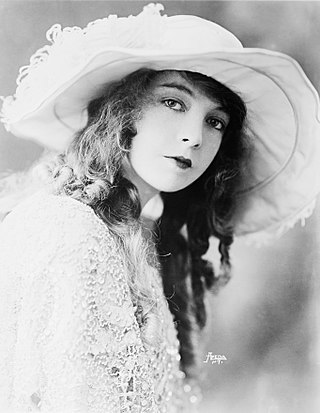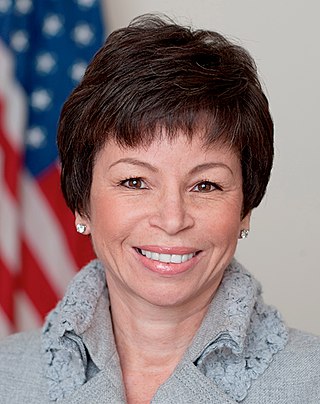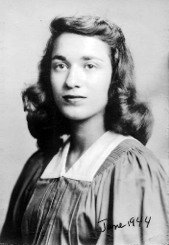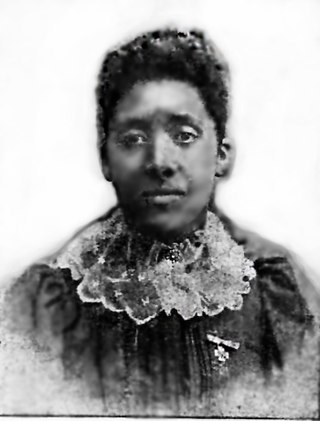Related Research Articles

Lillian Diana Gish was an American actress, director, and screenwriter. Her film-acting career spanned 75 years, from 1912, in silent film shorts, to 1987. Gish was called the "First Lady of American Cinema", and is credited with pioneering fundamental film performance techniques. In 1999, the American Film Institute ranked Gish as the 17th greatest female movie star of classic Hollywood cinema.

Frances Elizabeth Caroline Willard was an American educator, temperance reformer, and women's suffragist. Willard became the national president of Woman's Christian Temperance Union (WCTU) in 1879 and remained president until her death in 1898. Her influence continued in the next decades, as the Eighteenth and Nineteenth Amendments to the United States Constitution were adopted. Willard developed the slogan "Do Everything" for the WCTU and encouraged members to engage in a broad array of social reforms by lobbying, petitioning, preaching, publishing, and education. During her lifetime, Willard succeeded in raising the age of consent in many states as well as passing labor reforms including the eight-hour work day. Her vision also encompassed prison reform, scientific temperance instruction, Christian socialism, and the global expansion of women's rights.

Lillian D. Wald was an American nurse, humanitarian and author. She was known for contributions to human rights and was the founder of American community nursing. She founded the Henry Street Settlement in New York City and was an early advocate to have nurses in public schools.

Elisabeth A. Gotbaum is an American civil servant, politician and a former New York City Public Advocate. She was elected Public Advocate for New York City in 2001 and reelected in 2005. She was the third woman elected to a citywide post in NYC history. The other two were Carol Bellamy, who served as city council president from 1978 to 1985, and Elizabeth Holtzman, who served as comptroller from 1990 to 1993. She is a Democrat and currently serves as Executive Director of Citizens Union.

The United States Sanitary Commission (USSC) was a private relief agency created by federal legislation on June 18, 1861, to support sick and wounded soldiers of the United States Army during the American Civil War. It operated across the North, raised an estimated $25 million in Civil War era revenue and in-kind contributions to support the cause, and enlisted thousands of volunteers. The president was Henry Whitney Bellows, and Frederick Law Olmsted acted as executive secretary. It was modeled on the British Sanitary Commission, set up during the Crimean War (1853-1856), and from the British parliamentary report published after the Indian Rebellion of 1857.
Victor H. Gotbaum was an American labor leader. From 1965 to 1987, he was president of AFSCME District Council 37 (DC37), the largest municipal union in New York City.

District Council 37 is New York City's largest public sector employee union, representing over 150,000 members and 50,000 retirees.

Lillian M. N. Stevens (1843–1914) was an American temperance worker and social reformer, born at Dover, Maine. She helped launch the Maine chapter of the Woman's Christian Temperance Union (W.C.T.U.), served as its president, and was elected president of the National W.C.T.U. after the death of Frances Willard. Stevens also served as Editor-in-chief of the W.C.T.U.'s organ, The Union Signal.
Alan Viani was head of the Department of Research at DC37, the largest municipal union in New York City, from 1973 to 1985. He was later involved with resolving the 2005 NYC transit strike.

Valerie June Jarrett is an American businesswoman and former government official serving as the chief executive officer of the Obama Foundation since 2021. She previously served as the senior advisor to U.S. President Barack Obama and assistant to the president for public engagement and intergovernmental affairs from 2009 to 2017. Before that, she served as a co-chair of the Obama–Biden Transition Project.

Georgette Seabrooke, was an American muralist, artist, illustrator, art therapist, non-profit chief executive and educator. She is best known for her 1936 mural, Recreation in Harlem at Harlem Hospital in New York City, which was restored and put on public display in 2012 after being hidden from view for many years.

Katharine Bement Davis was an American progressive era social reformer and criminologist who became the first woman to head a major New York City agency when she was appointed Correction Commissioner on January 1, 1914. Davis was a former school teacher from upstate New York, who later became one of the nation's first female doctorates when she received her Ph.D. in economics from the University of Chicago in 1901. Davis was also known for her work as an American penologist and a writer who had a long-lasting effect on American penal reform in the late 19th and early 20th centuries.

Bernice Resnick Sandler was an American women's rights activist. She is best known for being instrumental in the creation of Title IX, a portion of the Education Amendments of 1972, in conjunction with representatives Edith Green and Patsy Mink and Senator Birch Bayh in the 1970s. She has been called "the Godmother of Title IX" by The New York Times. Sandler wrote extensively about sexual and peer harassment towards women on campus, coining the phrase "the chilly campus climate".

Wilhelmina Hay Abbott, also known by the name "Elizabeth Abbott," was a Scottish suffragist, editor, and feminist lecturer, and wife of author George Frederick Abbott.

Gerri Major (1894–1984) was an African-American woman who lived in Harlem during a career that stretched from the 1920s through the 1970s. She was successful in a number of overlapping vocations, including journalist, editor, newscaster, publicist, public health official, author and community leader. An article celebrating her 80th birthday stated that "Gerri was definitely one of the 'new Negroes' of the early 20th Century," adding that by the end of the 1930s she had become "one of the best known black women in America."

Emma Ann Reynolds (1862-1917) was an African-American teacher, who had a desire to address the health needs of her community. Refused entrance to nurses training schools because of racism, she influenced the creation of Provident Hospital in Chicago and was one of its first four nursing graduates. Continuing her education, Reynolds became a medical doctor serving at posts in Texas, Louisiana and Washington, D.C. before permanently settling in Ohio and completing her practice there.
Stanley Weldon Hill was an American labor organizer, born in The Bronx, New York City. He succeeded Victor Gotbaum as executive director of District Council 37 of the American Federation of State, County, and Municipal Employees (AFSCME), serving from 1987 to 1998. In 1988 he served as New York co-chair of Jesse Jackson's presidential campaign.

Kina Isis Collins is an American community organizer and activist, whose work has focused on issues of gun violence, criminal justice reform, and universal healthcare. Collins was a candidate in the 2022 U.S. House election for Illinois' 7th congressional district Democratic primary, and was previously a primary candidate for the same seat in the 2020 election.
The Lincoln School for Nurses, also known as Lincoln Hospital and Nursing Home School for Nurses, and Lincoln Hospital School of Nursing, was the first nursing school for African-American women in New York City. It existed from 1898 to 1961. It was founded by Lincoln Hospital in Manhattan. The hospital and nursing school, moved to 141st Street, between Concord Avenue and Southern Boulevard in Mott Haven, the South Bronx, after 1899.
References
- ↑ Reverby, Susan M. (1994). "Roberts, Lillian Davis (1928–)". Black Women in America: An Historical Encyclopedia. Bloomington: Indiana University Press. pp. 984–985. ISBN 0-253-32774-1.
- ↑ Greenhouse, Steven (March 2002). "PUBLIC LIVES; Back to the Battlefield, Heeding Her Old Union's Call". The New York Times.
- ↑ "PEP March 2002: Meet the New DC 37 Officers". Archived from the original on 2017-06-06. Retrieved 2006-07-31.
- ↑ "News Release, October 8, 2014: District Council 37 Executive Director Lillian Roberts announces her retirement effective December 31, 2014". Archived from the original on 2015-04-12. Retrieved 2015-04-07.